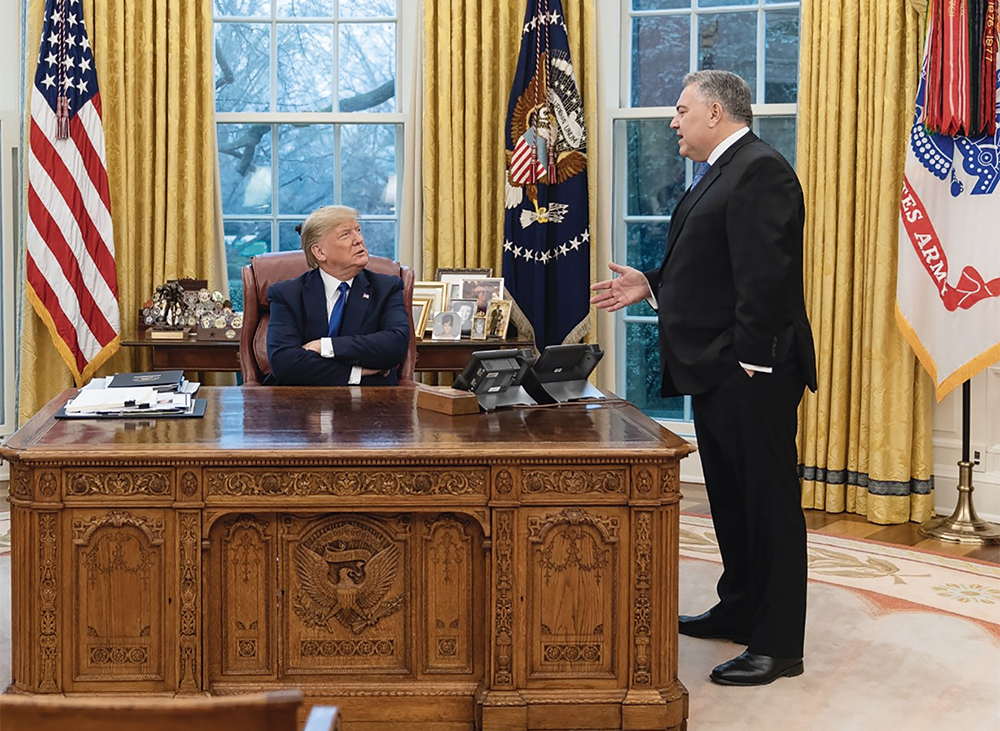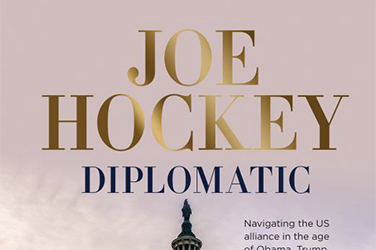
- Free Article: No
- Contents Category: Memoir
- Review Article: Yes
- Article Title: Golf diplomacy
- Article Subtitle: A canny emissary in Washington
- Online Only: No
- Custom Highlight Text:
In the chaos that opened the Trump administration in 2017, foreign governments were looking for any and all insiders for information. Australia turned to Joe Hockey, who turned to golf. In this very readable account of the former treasurer’s four years in Washington (2016–20), Hockey tells us how he navigated ‘TRUMPAGEDDON’. This is a story replete with funny anecdotes and unsettling observations. Diplomatic leaves the reader convinced that diplomacy is more about art and luck than about science and process. It is also oddly reassuring about the vicissitudes that the Australia–United States relations can weather, even under the most weird leadership.
- Article Hero Image (920px wide):

- Article Hero Image Caption: Ambassador Joe Hockey meeting with US President Donald Trump in the Oval Office. Image supplied.
- Alt Tag (Article Hero Image): Ambassador Joe Hockey meeting with US President Donald Trump in the Oval Office. Image supplied.
- Featured Image (400px * 250px):

- Alt Tag (Featured Image): Timothy J. Lynch reviews 'Diplomatic: A Washington memoir' by Joe Hockey with Leo Shanahan
- Book 1 Title: Diplomatic
- Book 1 Subtitle: A Washington memoir
- Book 1 Biblio: HarperCollins, $34.99 pb, 306 pp
- Book 1 Readings Link: booktopia.kh4ffx.net/LPdjoo
Hockey’s character is the root cause of his significant success: his unusual persistence, his distrust of career diplomats (fearing leaks, he never sent a diplomatic cable), his disdain towards his own boss, his loathing of cocktail parties, his understanding of, but recurrently misplaced faith in, Donald Trump, and how he made sport generally, and golf specifically, a vehicle for his diplomacy. All are illustrated in his account.
Hockey was federal treasurer under Tony Abbott (2013–15), delivering an unpopular budget in 2014 that was widely credited with his boss’s removal by Malcolm Turnbull. Hockey, we learn in this book, never forgave this act of regicide – not least because it meant that Hockey himself would not succeed Abbott. Turnbull, the prime minister who sent Hockey to Washington, drifts through the book as a nervous nellie, both suspicious of Hockey’s risk-taking but also in need of it.
The fallout from the infamous phone call between Trump and Turnbull, when the new president, in his first call with a foreign leader, all but hung up on his Australian counterpart, was cleaned up by Hockey’s subsequent bringing them together aboard the USS Intrepid – ‘it was like the two men were the best of friends’ – and a White House state dinner (‘a great success’).
Despite his name – an Anglicised version of his Armenian grandfather’s Hockedunian – the sport Hockey excelled at was golf, or at least golf diplomacy. It was a golfer, Greg Norman, who effected his first meeting with Trump. It was on a golf course that Hockey got to know Trump, sinking a long putt to earn the president’s respect, in the author’s telling. And it was via golf that Hockey was able to restore bilateral relations after that first awkward phone call.
Shakespeare has the French dauphin goad Henry V by gifting him tennis balls. But Hockey used the same sport to build bridges. Over the objections of frugal career diplomats, he renovated the grass tennis courts at his official residence. ‘This may not sound like a big deal, but it was actually the only one in Washington, DC … all of a sudden several members of the Trump administration and members of Congress all wanted to come around and play.’ The networks this afforded Hockey were exploited throughout his ambassadorship. Convinced that, like him, every Washington official hated cocktail parties, Hockey schmoozed for Australia on that tennis court.
Somewhat predictably for an Australian, sport is central to the book and its author’s grasp of his new home. ‘There is no better introduction to the United States,’ writes Hockey, ‘than the Super Bowl.’ ‘Having a love of sport is a great asset in diplomacy.’ Most codes get a mention. In a hilarious account, the author attends a National Hockey League game with his son. On attempting to buy him a uniform, Hockey has his credit card rejected.
‘That’s not a real card,’ said the store clerk.‘What? Yes it is,’ I replied.‘Joe Hockey? That’s not a real name!’‘It is! That’s my real name!’‘C’mon, really? Joe Hockey?’
Sport is complemented by military history. The shared sacrifice, the bleeding together of Americans and Australians since 1918, is a frame of reference for much of Hockey’s diplomacy. He is hardly the first ambassador to draw on this. But he was especially adept at using military symbolism and ceremony to bring a notoriously anti-war, Vietnam draft-dodging Trump into Australia’s orbit. Hockey’s defining slogan was ‘100 years of mateship’. Not even the British could match this (‘250 years of mateship [apart from the first 100 and Vietnam]’). He had it plastered across the Australian embassy. It worked, giving his diplomacy a historical anchor that even the most ahistorical of presidents could appreciate.
The spectre that haunts the narrative is, of course, President Trump. Barack Obama (too left and lawyerly) and Joe Biden (too old) are much less interesting to the Australian ambassador. Trump fascinates him. Hockey reminds us that he had predicted Trump’s 2016 win all along. He credits himself with being especially attuned to what made Trump tick. Hockey’s feel for American populism, when so much of the coastal media were deriding it, gave him empathy when others chose anger. In the build-up to the 2020 election, Hockey created ‘Mary Milwaukee from Wisconsin’, a Trump voter who didn’t care about Trump’s ego. What she did care about was holding down her $11.11-an-hour Walmart job, her right to worship, the respect accorded her army son, and her daughter’s ability to afford college. When Trump spoke for her, argues Hockey, he elevated his campaign. But he did not do this enough.
The book is punctuated by the author’s dashed hopes that Trump could be something more than an anti-establishment rabble-rouser. There is genuine affection for Trump (‘He’s a funny guy, and good company – when he wants to be’) but also exasperation. Too often, bemoans Hockey, Trump saw compassion, much needed in 2020, as a sign of weakness. ‘He failed to understand that the nation was crying out for some sympathy from their leader over what was happening to them.’ Trump’s capacity for own goals perplexed the sports-loving ambassador.
The narrative is bookended by the presidential elections of 2016 and 2020, whose results were not accepted by the losing side. Ambassador Hockey offers us a sure-footed and realistic account of the ensuing national turmoil. What is remarkable is how stable was the relationship between Canberra and Washington. Political scientists might call this path dependence: the interests that diplomats seek to advance are pretty fixed. The relative power of states dictates the enduring tenor of their relationships much more than do shifting personalities.
And yet Hockey offers us a vivid glimpse of how the personality and psychology of democratic leaders can be appropriately manipulated to advance the interests and prosperity of their peoples. This is how Hockey saw his diplomatic function. And he was good at it. Determined not to retard Australian interests by indulging a distaste for Trump – the trap into which his British counterpart, Kim Darroch, fell – Hockey found a way to work with this perplexing man. That he enjoyed a modicum of success during a time of great tribulation remains testament to his diplomacy and his persistence.


Comments powered by CComment